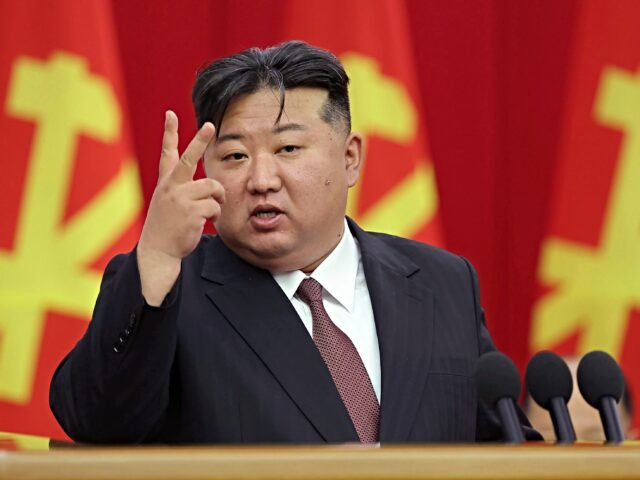The North Atlantic Treaty Organization (NATO) on Wednesday issued a statement condemning North Korea’s weapons exports to Russia and expressing concern about the alliance between Pyongyang and Moscow.
The statement was a major victory for South Korean diplomats who have been urging NATO to recognize North Korea as a threat to global security.
“We strongly condemn the DPRK’s exports of artillery shells and ballistic missiles, which are in violation of numerous United Nations Security Council resolutions, and note with great concern the deepening ties between the DPRK and Russia,” NATO leaders meeting in Washington said on Wednesday. DPRK stands for Democratic People’s Republic of Korea, the North Korean tyranny’s preferred name for itself.
“Any transfer of ballistic missiles and related technology by Iran to Russia would represent a substantial escalation,” the declaration added.
NATO said North Korea and fellow axis of tyranny member Iran are “fueling Russia’s war of aggression against Ukraine by providing direct military support to Russia, such as munitions and uncrewed aerial vehicles (UAVs), which seriously impacts Euro-Atlantic security and undermines the global non-proliferation regime.”
RELATED: Kim Jong Un Supervises Tests of “Super-Large” Rocket Launchers Near Pyongyang
Both of those malignant states took a backseat in NATO’s condemnation to the People’s Republic of China (PRC), which has “become a decisive enabler of Russia’s war against Ukraine through its so-called ‘no limits’ partnership and its large-scale support for Russia’s defense industrial base.”
“We call on the PRC, as a permanent member of the United Nations Security Council with a particular responsibility to uphold the purposes and principles of the U.N. Charter, to cease all material and political support to Russia’s war effort,” the statement said.
The NATO statement called for closer cooperation with South Korea and other major regional partners such as Australia, Japan, and New Zealand, to contain threats to security in the Indo-Pacific region.
“We are strengthening dialogue to tackle cross-regional challenges and are enhancing our practical cooperation, including through flagship projects in the areas of supporting Ukraine, cyber defense, countering disinformation, and technology. These projects will enhance our ability to work together on shared security interests,” NATO said.
South Korean Foreign Ministry spokesman Lim Soo-suk welcomed the NATO declaration on Thursday.
“It sends a strong message to Russia and North Korea. We urge the countries to take the international community’s concerns seriously and immediately stop related activities,” Lim said.
South Korean President Yoon Suk-yeol and Japanese Prime Minister Kishida Fumio, who were both invited guests at the NATO summit in Washington, issued their own joint statement on Wednesday pledging deeper cooperation to counter the Russia-North Korea alliance.
“The recent moves by Russia and North Korea are causing serious concern not only in East Asia but also for global security. I hope that South Korea and Japan will cooperate closely with NATO member countries and reaffirm that the security of the North Atlantic and Northeast Asia cannot be separated,” said Yoon.
“The security of the Atlantic and the Indo-Pacific is inseparable. This summit provides an opportunity to deepen cooperation between NATO and our Indo-Pacific partners,” said Kishida.
Both Asian leaders stressed the importance of trilateral security cooperation with the United States, in addition to working more closely with NATO.
RELATED: Finding Freedom! North Korean Defector: “I Didn’t Even Know What That Was” Until Long After Escape
Video Source: Jack Knudsen / Breitbart NewsJapan and South Korea have suffered through some rough patches in their relationship over the past few years, including disputes over compensation for Korean victims of the Japanese invasion in World War II and South Korea banning Japanese seafood last year after the release of treated wastewater from the Fukushima nuclear reactor began.
Both nations have also felt increasing pressure from the contradiction between their strategic relationship with the United States and their heavy trade with China. Both are facing demographic death spirals that are weakening their economies.
North Korea slipping comfortably into the axis of tyranny with China, Russia, and Iran seems to have reminded South Korean and Japanese leaders of how much they have in common, at least under the current administrations in Seoul and Tokyo – neither of which is in great political shape at the moment.
South Korea and Japan have both expressed interest in joining the AUKUS security alliance with America, the United Kingdom, and Australia. NATO’s recognition of the North Korean threat could make that prospect seem even more appealing and, given the current state of Yoon and Kishida’s poll numbers, they might want to move on the opportunity quickly.

COMMENTS
Please let us know if you're having issues with commenting.